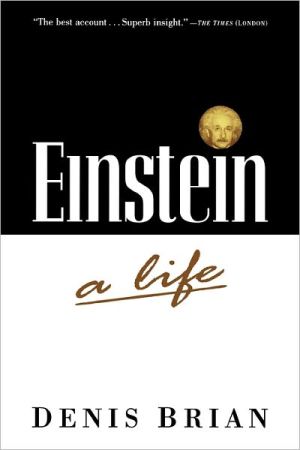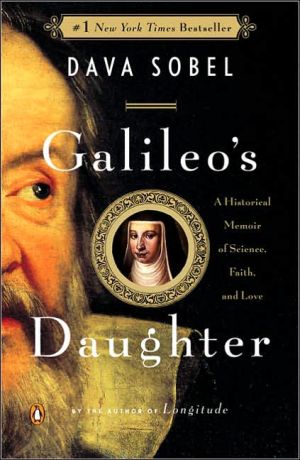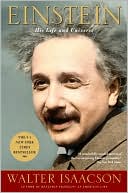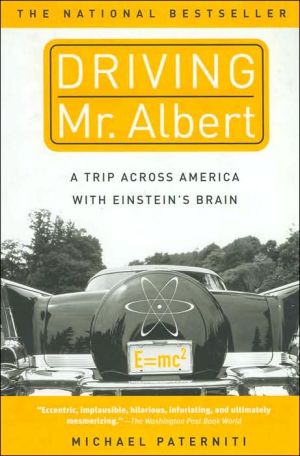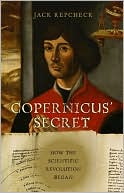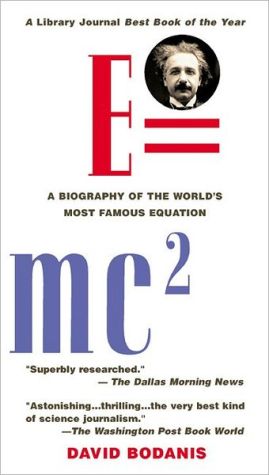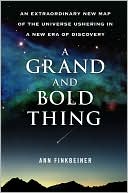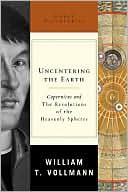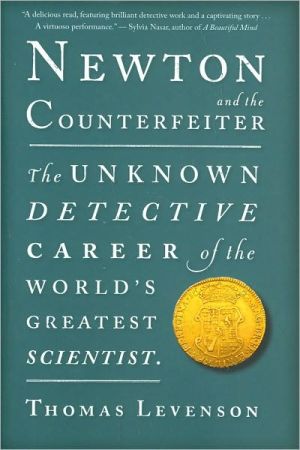Einstein: A Life
Blends the brilliance of the scientific genius with the compassion, playfulness, and wit of the private figure\ "A fascinating read with more interesting material about Einstein as a human being than I have ever seen before."—Robert Jastrow, astrophysicist and bestselling author\ "A thoughtful and captivating account of one whom I had the joy of knowing and loving."—George Wald, Nobel Prize Laureate\ His face is one of the most recognized on the planet. His very name is synonymous with...
Search in google:
Acclaim for Einstein: A Life"Denis Brian's convincing picture . . . only makes our wonder grow at Einstein's sublime achievements." —The Washington Post"Does much to reveal the man behind the image . . . Brian's intimate work proves that in literature, as in science, taking a careful look can be a rewarding endeavor." —Detroit Free Press."A fascinating, vastly enjoyable, deeply researched and fair account of Einstein the man." —Physics World"Exhaustively researched, almost obsessively detailed, written with unobtrusive informality, the book is exemplary as a record of Einstein's personal and professional life." —The Spectator (U.K.)"An utterly fascinating life of a great scientist full of new insights and very readable." —Ashley Montagu"A fascinating read with more interesting material about Einstein as a human being than I have ever seen before . . . Once I started it, I couldn't put it down." —Robert Jastrow astrophysicist and bestselling author"A thoughtful and captivating account of one whom I had the joy of knowing and loving." —George Wald Nobel Laureate Publishers Weekly With his halo of white hair, Albert Einstein looked the part of the century's secular saint, and Brian quotes a child asking, "Is that the Lord?" As the successor to Copernicus and Newton in revolutionizing concepts of the physical universe, Einstein was possibly the next best thing. Aside from awkward paragraph transitions and some lazy shortcuts that use parts of interviews verbatim, Brian's anecdotal biography, with just enough science to make Einstein's achievements persuasive, humanizes the icon, whose private life was guarded by zealous executors after his death at 76 in 1955. Once Einstein's elegantly audacious relativity theory emerged in 1905, when he was an obscure 26-year-old Swiss Patent Office examiner, he was on his way to a reputation as "the Columbus of science," his every scrap of paper so treasured that some of his checks were not cashed. In a few strokes of his pen-E=MC2-he revolutionized physics, explaining, "Time and space and gravitation have no separate existence from matter." Despite years of resistance from scientific and political reactionaries, deftly dramatized by Brian, observed phenomena would validate Einstein's equations. After his Nobel Prize in 1922, he unsuccessfully chased the holy grail of physics, a "unified field theory" that might mesh electromagnetism with gravitation. No more successful were his two marriages or his parenting. Eager to prove that the liberal, sometimes nave Jewish refugee from the Nazis was disloyal to his adopted country, J. Edgar Hoover would compile a 1160-page file, what Brian calls a jumble "of fact and fantasy, of lies, rumors, and ravings"-the largest and most unreliable of the dozens of biographies of Einstein. More the life than the work, Brian's unworshipful account is genial and judicious. (May)
\ \ \ \ Chapter One\ \ \ Childhood and Youth\ 1879 to 1895 From birth to age 16\ Albert Einstein was born on March 14, 1879, in Ulm, Germany, with a swollen, misshapen head and a grossly overweight body, causing his grandmother, Jette Koch, to wail, "Much too fat! Much too fat!" His alarmed parents, Hermann and Pauline, consulted the doctor, who assured them that time would heal the deformities, and he was right. Within months everything had become normal, except for the back of Albert's skull. That always remained unusually angular.\ But for his parents the worrying was not over, as Albert's speech was late in developing. What in fact happened is in dispute. Einstein maintained he made no attempt to talk until he was past three, and his parents feared that he was mentally retarded. His explanation was that he consciously skipped baby babbling, waiting until he could speak in complete sentences. He stuck to this account throughout his life, responding to an inquiry by his biographer, Carl Seelig, in 1954, as follows: "My parents were worried because I started to talk comparatively late, and they consulted a doctor because of it. I cannot tell you how old I was at the time, but certainly not younger than three."\ His version of the facts is contradicted in a letter written by his doting maternal grandmother, Jette. After she and her husband, Julius, visited the Einsteins when Albert was just two years, three months old, she wrote: "He was so good and dear and we talk again and again of his droll ideas." How could he have conveyed droll ideas without speaking?\ Albert's sister, Maja, supports their grandmother.Presumably using her parents as the sources, Maja reports that before her birth on November 18, 1881, when Albert was still four months shy of three, he had been promised a new baby to play with. Evidently expecting a toy, he greeted her appearance with a disgruntled "Where are the wheels?" Not bad for a "backward" two-year-old!\ Albert was certainly a late and reluctant talker, but not nearly as late as he recalled. He clearly hoarded his words, doling them out at rare intervals to a favored few: the child equivalent of an introspective adult who shuns small talk.\ The Einsteins had many relatives in southern Germany, but Albert never knew his paternal grandparents. Hermann's father, Abraham Einstein reputedlya decent, intelligent man, and his unremarkable wife, Hindel, from Buchau on the Federsee, both died while Albert was an infant. His maternal grandfather, Julius Derzbacher, an enterprising and hardworking small-town baker from Cannstatt, adopted the family name of Koch and made a fortune in the grain trade. He and his brother were partners, and they and their families shared a house. As Maja remembered it, "Their wives [also] shared the cooking, each taking charge of it . . . in weekly turns, If such an arrangement is rather rare, and not only in Germany, theirs was all the more remarkable because it lasted for decades without any friction."\ While Albert was an infant, his generally imperturbable father was preoccupied with the family's foundering electrochemical business. Hermann's brother and partner, Jakob, suggested a way out—that they jump ship before it sank. Why stay in a backwater? Ulm's only distinction then was a cathedral boasting the country's biggest organ. Less than a hundred miles away Munich beckoned, the fast-growing political and intellectual capital of southern Germany. The dynamic, ambitious younger brother painted a not altogether fanciful picture of the vibrant metropolis with its sophisticated population crying out to be converted from gaslight to electricity. Hermann was persuaded.\ So the Einsteins moved from their modest apartment in Ulm to a large, welcoming house, which they shared with jakob, in a shady, tree-filled garden on Munich's outskirts. The brothers added plumbing to their electrochemical enterprise and planned to use their profits to mass-produce and market a dynamo Jakob had recently invented.\ Despite their early concern, the Einsteins hardly coddled their firstborn, giving him unusually early training in self-reliance. We have his sister's word for it that before Albert was four his parents encouraged him to roam the neighborhood and even to cross the local streets on his own. The first few times they watched surreptitiously to ensure that he looked both ways before crossing. After that he went solo. True, the traffic was mostly horse-drawn carriages, but a child of four at large in the streets was certainly at risk.\ Munich did provide the Einstein brothers with more business opportunities than Ulm, but it also teemed with fierce competitors. Once again the brothers ran into trouble. Hermann faced it with characteristic calm. He appeared to regard a financial emergency as an immutable law of nature and was confident that things would work out in the end, or that his wife's wealthy father, Julius, would fling him a lifeline.\ Even though the business was shaky, Pauline decided it was time to imbue Albert with her passion for music: she bought a fiddle and hired a teacher. Albert resisted, throwing a chair and a tantrum—which sent his teacher scurrying for the nearest exit. She never came back. Pauline persisted and hired a replacement. Albert was still liable to express his discontent with the nearest weapon at hand, but the new teacher was made of sterner stuff than the first, and the lessons continued under duress.\ On the rare occasions when Albert mixed with children his age, he was quiet and withdrawn—the onlooker. Relatives thought of him as a dear little fellow who never joined in the other children's squabbles, except to separate the combatants. His younger sister knew the other Albert, the little hellion with a wild temper, and she bore the brunt of his ferocity. Maja escaped serious and frequent injury because she could detect the onset of his rages—his face turned yellow—and would run for cover. His color change was not a foolproof warning signal, however. Once she barely missed getting a concussion from a bowling ball Albert aimed at her bead. The next time his face turned from pink to yellow, either her luck ran out or she wasn't watching. He closed in for the attack and smashed Maja over the head with a garden hoe. Years later, when her brother was a dedicated pacifist and literally wouldn't swat a fly, Maja quipped, "A sound skull is needed to be the sister of a thinker."\ The "thinker" suddenly emerged from the junior Jekyll and Hyde when Albert was five and ill in bed. To keep him amused, his father gave him a magnetic compass. Instead of throwing it at his sister, Albert shook it and turned it, hoping to catch it unawares. He was both intrigued and puzzled by the compass. What invisible force, he wondered, always made the needle point north? It seemed like a mechanical homing pigeon with a built-in direction finder. He grappled with the enigma for a long time, trying to discover the answer for himself\ Two years later when he began elementary school, his teachers, far from rating him a thinker, revived early fears that he was mentally retarded. Perhaps)s his mother was partly to blame for having had him tutored at home until he was seven. She had proudly accepted the tutor's inflated assessment of Albert as a whiz kid. By prolonging his isolation from other children she had helped to create a misfit, the odd boy out, which he was inclined to be in any case.\ Classmates regarded Albert as a freak because he showed no interest in sports. Teachers thought him dull-witted because of his failure to learn by rote and his strange behavior. He never gave a snappy answer to a question like other students, but always hesitated. And after he had answered, Albert silently moved his lips, repeating the words.\ This was obviously his way of coping with the required rote learning. Teachers punished wrong answers with painful whacks on the knuckles. To avoid the pain and humiliation, Albert played for time until he could conjure up the proper reply. After giving it, he silently checked himself to make sure he'd got it right, and perhaps to ensure he wouldn't forget it.\ Those school days were a taste of things to come. He ignored whatever bored him, making no attempt to master it; but if something caught his interest, he embraced it with the purposeful concentration of a watchmaker. Once, for example, his sister Maja watched him slowly and carefully build a house of cards. She had seen others do it and tried it herself, but these houses never reached more than four stories before collapsing. Her brother stuck at it until his house of cards grew to an astonishing fourteen stories.\ After two years in elementary school, Albert had shown a talent both for math and for Latin; he liked the latter because it was logical. He was hopeless at everything else and was subjected to angry complaints and painful knuckle raps, which he bore with a faint grin.\ One bright spot in the week was Thursday. That was the day when, following a traditional charitable practice of European Jews, the Einsteins hosted a poor student for lunch. At this time, the beneficiary of this practice was Max Talmud (later Talmey), a medical student, who regularly (and for years) joined the family for lunch. As a result, what Albert missed in school he more than made up forat the Thursday lunches. Sensing the youngster's intellectual hunger, Talmud fed him tidbits of the latest scientific breakthroughs, recommended groundbreaking scientific authors, and discussed mathematics and philosophy as if he and Albert were contemporaries.\ Albert flourished in this atmosphere and showed his prowess when Uncle Jakob turned up for the lunchtime seminars armed with tricky math problems. When he solved them, Albert yelled triumphantly like a soccer player scoring an unlikely goal. jakob had a way with words and got Albert interested in algebra by describing it as "a merry science in which we go hunting for a little animal whose name we don't know. So we call it X. When we bag the game we give it the right name."\ At twelve, now in high school, Albert had his first encounter with geometry. In later life he was to describe his discovery of Euclid as one of the great delights of his life and refer to a book on Euclidean geometry as "holy." (He had vivid recall of such early events. It was personal details, he said, that eluded him.\ Meanwhile, God waited in the wings. The Almighty was at best a shadowy figure in the Einstein household, where both parents were agnostics. They occasionally discussed Jewish traditions with their relatives. But if the subject of organized religions came up, Albert's father dismissed them all with derisive impartiality as ancient superstitions.\ The only Jew in his overwhelmingly Catholic class, he felt neither uncomfortable nor singled out, For example, he didn't take it personally when, in a show-and-tell attempt to enliven religious instruction, the teacher held up a big nail and compared it with those used to crucify Christ. Albert simply thought it was a botched attempt to arouse sympathy. Discussing the event as an adult with his friend and biographer Philipp Frank, Einstein speculated that such a vivid portrayal of brutality was more likely to arouse latent sadism than pity for victims of cruelty. The crucifixion aside, he enjoyed learning about Christianity. It reminded him of Jewish traditions occasionally mentioned at home and gave him a comforting sense of living in a caring, harmonious world.\ The state required that Albert be instructed in his faith. Even though both parents were without religious convictions, he had to be taught Judaism because of his Jewish heritage. This was easier said than done, as no one in his school or home was equipped for the task. Eventually a distant relative came to the rescue and was spectacularly successful,\ To say God stepped out of the shadows understates the case. The Almighty, dazzled Albert. All aglow, the twelve-year-old abandoned his devotion to math and science for the wisdom of Solomon and the ethics of his religious forefathers, all in the worshipful service of the Master of the Universe. Religious ecstasy converted him into an extrovert who composed songs in praise of God, which he belted out as he walked to and from his high school, the Luitpold Gymnasium. His bemused, indulgent parents took it in their stride, though they resisted vigorously when he tried to shame them into giving up pork.\ A year later, faith lost out to reason. Albert was lured back from his impassioned proselytizing to the fascination of science and philosophy. With his parents, Uncle jakob, and friend Max Talmud rooting for him, Albert tried out his intellectual wings. At thirteen, he began to study higher mathematics on his own, along with the intricate suppositions of Immanuel Kant—tough going at any age. Kant—the tiny, fragile eighteenth-century philosopher—proposed some bizarre ideas, such as that all planets have been or will be inhabited. Moreover, he peppered his discourse with snappy asides like a stand-up comedian—panning pompous philosophers, for example, as those who live on the higher towers of speculation where there is usually a great deal of wind." His comments on time and space—that they are not products of experience but concoctions of our minds which clothe our sense perceptions—reinforced Einstein's already aroused interest in the subject.\ At his most daring, Kant suggested that God might not exist. This idea enraged God-fearing Germans, especially clergymen, prompting some to name their dogs Kant. Ironically, having his name shouted all over the country provided great free publicity for the eccentric philosopher. Kant soon recanted, however, conceding that God was at least a possibility. Einstein reversed the process, first believing as a child, then doubting in a personal God for the rest of his life. He agreed with Kant about many things, however, including that the way to end world wars was through a world government.\ Though Einstein abandoned his uncritical religious fervor, feeling he had been deceived into believing lies, he never lost his admiration for the ethical and aesthetic aspects of some Christian and Jewish teachings. Attaching himself to no sect, repulsed by the rigid rules and compulsory behavior dictated by most organized religions, he was still considered by those who knew him to have been deeply religious. They cite his almost childlike wonder at the splendors of the universe and his belief in its ultimate harmony, his concern for the fate of others, and his active commitment to social justice. They also mention his frequent allusions to a cosmic intelligence.\ Philosophy and science were not the only enthusiasms to replace Albert's brief, enraptured encounter with organized religion. Herr Reuss, his literature teacher at the Gymnasium, introduced him to the works of such authors as Schiller, Shakespeare, and Goethe—all of whom became enduring favorites of his. (At home, Albert's father sometimes read those same writers aloud to the assembled family after dinner.) Reuss was one of the few teachers Albert liked, especially because he never demanded rote learning.\ Against the odds, his Years of enforced, mechanical violin lessons had made Albert a music addict. In time his violin became a near-permanent attachment, like his pipe. No one rejoiced more than Maja, who spent many evenings listening to her mother and brother play duets, mostly Mozart and Beethoven sonatas. After mastering the violin, Albert took up the piano, becoming so adept, Maja recalled, that he "constantly searched for new harmonies and transitions of his own invention." He also used music as a study aid. More than once Maja witnessed him solve a problem after a session on the violin or piano. He would play, then suddenly stop and cry out, "There, now I've got it!"\ If only he could have solved his father's business problems with a few bars of music. Tough competition and Hermann's free-and-easy management style had doomed the Munich enterprise, The brothers hadn't cleared enough even to market Jakob's newly invented dynamo.\ As the optimistic Hermann had anticipated, however, his wife's relatives came to his aid. The wealthy Kochs in Genoa offered to back him and Jakob in another venture, also installing electric lighting. There was one string attached,It would mean a second move, this time out of the country, from Germany to Italy. There the investors could keep a close watch on their investment and curb Hermann's overgenerous impulses toward others in trouble. The offer was accepted, although it meant leaving Albert alone in Munich.\ Now fifteen, he would soon be subject to the draft. The law required all fit young German males to complete military service before they could leave the country, so Albert had to stay behind to finish high school and then to tote a rifle. The rest of the family, Uncle Jakob included, traveled south across the border for a new life in Milan, Italy, near the new factory in Pavia.\ Reluctantly, Albert moved from his comfortable home with its large, tree-filled garden to a lonely and solitary existence in a boardinghouse. There were no friends to share his after-school hours, and his only visitor was a distant relative who looked in on him occasionally. He wrote regularly to his family but gave no hint of a growing depression. School had become a dread prospect. He went in trepidation to face teachers who barely tolerated him and schoolmates who kept their distance. They treated as a curious outcast this healthy male who never kicked a ball, would sooner read than run, and was less than eager to serve in the army.\ Greek was his biggest ordeal. His failure to grasp it had so exasperated the teacher that he conducted the class as if Albert weren't there. Sitting at the back of the room, Albert didn't always catch what was said and probably wouldn't have understood it anyway. Bored and uneasy, aware of the teacher's animosity, he just sat there, smiling slightly. Whether the smile was the grin-and-bear-it variety or derisive is uncertain, but it turned the teacher's tongue from Greek to plain German, in which he told Albert that he would never amount to anything, that he was wasting everyone's time, and that he should leave the school immediately. When Albert protested that he had done nothing wrong, the teacher complained, "But you sit there in the back row, smiling, And that udnermines the respect a teacher needs for his class."\ In fact, Albert longed to fulfill the Greek teacher's wishes, During a visit to the family doctor for a minor illness he discussed the situation, unable to hide his desperation. Albert Einstein was never the calm, imperturbable Buddha-like character of popular myth. At fifteen, he was both high-strung and emotional, and felt abandoned. The doctor recognized this and gave him a to-whom-it-may-concern letter, warning that unless Albert was allowed to recuperate with his family he might suffer a complete breakdown.\ To strengthen his hand, Albert showed the doctor's letter to a math teacher—on the face of it a bad choice, because the teacher was one of the few who would have liked Albert to stay. Nevertheless, he too saw that Albert was sick with worry, and sympathized with his plight. He wrote a note saving that Einstein was so proficient at math there was little more he could teach him.\ Albert took these possible passports to the school principal and they did the trick. He was free from-school and the country. Had he waited until he was sixteen he would have first been required to complete his military service before joining his family abroad.\ If he had in fact been heading for a breakdown, the family reunion in Italy was the cure. Maja had never seen him in such high spirits. He soon had a coterie of friends. Yet he had arrived at a bad time. His father was struggling toget the new business off the ground and hardly welcomed the added burden of a school dropout. They constantly argued over Albert's future. For now he seemed happy to drift aimlessly, stirring himself only to visit Milan's museums and art galleries or to explore the countryside with his newfound friends.\ When pressed, Albert said that he might eventually consider teaching philosophy, Kant especially. This was too much for his harassed father, who ridiculed the "philosophical nonsense" and pushed for a practical job such as electrical engineering. They were doubtless too emotionally upset to appreciate the irony that Hermann was advocating a trade rapidly taking him down to financial ruin for the third time.\ Albert put up a strenuous fight, saying that even the thought of a practical job was unbearable. He clung to his dream of teaching philosophy, although it was impossible without a degree, and as a high-school dropout he had spoiled any chance of attending a university. Without further education only practical jobs were open to him, and the best of those required technical college training. He needed a college diploma even to teach in high school.\ Hermann finally prevailed, persuading Albert to bear the unbearable and to apply to a technical college for a course in electrical engineering. Albert set his sights high-on the Zurich Polytechnic, a Swiss technical college with an international reputation. Its other big attraction was that he had merely to pass the entrance exam; he wouldn't have to finish high school. Meanwhile, finally moved by his father's plight, he agreed to help out at the family's failing business.\ Maja was astounded by the change in her brother in just six months. The nervous, withdrawn dreamer had become an amiable, outgoing young man with a tart sense of humor. Was it the Italian air? The warmhearted people? His escape from purgatory?\ What hadn't changed was his laserlike ability to focus on whatever held his interest, On social occasions, when the living room was filled with conversation and music, Albert brought pen, ink, and notebook to the party rather than shutting himself up in his room to study. Maja was amused to see him squeeze himself onto the sofa, balance the inkwell on the armrest, then set to work apparently oblivious of all distractions,\ His favorite uncle, Caesar Koch, proudly displayed an essay Albert had mailed to him describing a proposed experiment to determine if electricity, magnetism, and the ether were connected. In those days, the ether was thought to be a rarefied and invisible element permeating all space. Einstein's essay showed original thinking, even though experiments later demonstrated there was no such thing as the ether.\ When not studying for the college entrance exam, Albert kept his word and helped out at the family business. There his Uncle Jakob and an assistant engineer had been stymied for hours over calculations needed to solve a technical problem. Albert offered to try his hand. He had the answer in fifteen minutes. Jakob enthusiastically seconded Caesar in predicting Albert's great future.\ These lofty predictions only compounded the shock when Albert flunked the entrance exam to Zurich Polytechnic. He had been floored by French, chemistry, and biology, subjects he had neglected through lack of interest, Despite this traumatic failure, his uncles were not alone in detecting Albert's unusual talents. Heinrich Weber, the Polytechnic's professor of physics, was so impressed with Albert's high scores in math and science that he invited him to audit his lectures. And Albin Herzog, the college principal, noting that at sixteen Albert was two years younger than most taking the exam, took that into consideration and promised to admit him the following year. Albert wouldn't even have to take the exam again. He just had to get a high-school diploma from any school of his choice. Failure had turned into near triumph.
PrefaceAcknowledgments1Childhood and Youth12First Romance93To Zurich and the Polytechnic154Marriage Plans255Seeking a Position306The Schoolteacher357Expectant Father398Private Lessons449The Patent Office5110The Olympia Academy5411The Special Theory of Relativity6012"The Happiest Thought of My Life"6913To Prague and Back7914The War to End All Wars8915In the Spotlight10016Danger Signals10717Einstein Discovers America11818The Nobel Prize13719The Uncertainty Principle15520The Perfect Patient16521The Unified Field Theory17322On the International Lecture Circuit19123Einstein in California20824Weighing Options22525Einstein the Refugee24126A New Life in Princeton25627Settling In27428Family Matters28529Politics at Home and Abroad29930World War II and the Threat of Fission31131The Race for the Bomb32632Einstein Goes to War33633The Atomic Bomb34234Toward a Jewish State34735The Birth of Israel35836The FBI Targets Einstein37437The Communist Witch-Hunt38238Conversations and Controversies39339Einstein's Mercy Plea for the Rosenbergs40440The Oppenheimer Affair41541The Last Interview42142Einstein's Legacy430Appendix: Einstein's Brain437Notes441Bibliography481Index491
\ Publishers Weekly - Publisher's Weekly\ With his halo of white hair, Albert Einstein looked the part of the century's secular saint, and Brian quotes a child asking, "Is that the Lord?" As the successor to Copernicus and Newton in revolutionizing concepts of the physical universe, Einstein was possibly the next best thing. Aside from awkward paragraph transitions and some lazy shortcuts that use parts of interviews verbatim, Brian's anecdotal biography, with just enough science to make Einstein's achievements persuasive, humanizes the icon, whose private life was guarded by zealous executors after his death at 76 in 1955. Once Einstein's elegantly audacious relativity theory emerged in 1905, when he was an obscure 26-year-old Swiss Patent Office examiner, he was on his way to a reputation as "the Columbus of science," his every scrap of paper so treasured that some of his checks were not cashed. In a few strokes of his pen-E=MC2-he revolutionized physics, explaining, "Time and space and gravitation have no separate existence from matter." Despite years of resistance from scientific and political reactionaries, deftly dramatized by Brian, observed phenomena would validate Einstein's equations. After his Nobel Prize in 1922, he unsuccessfully chased the holy grail of physics, a "unified field theory" that might mesh electromagnetism with gravitation. No more successful were his two marriages or his parenting. Eager to prove that the liberal, sometimes nave Jewish refugee from the Nazis was disloyal to his adopted country, J. Edgar Hoover would compile a 1160-page file, what Brian calls a jumble "of fact and fantasy, of lies, rumors, and ravings"-the largest and most unreliable of the dozens of biographies of Einstein. More the life than the work, Brian's unworshipful account is genial and judicious. (May)\ \ \ \ \ Library JournalThe making of the mythology of Albert Einstein began well before his death and shows no sign of abating. One of these books aims to cut through the myth; the other to capitalize on it. Brian's ambitious and well-researched work is a refreshing change from the recent glut of revisionist Einstein biographies, like Roger Highfield and Paul Carter's tawdry The Private Lives of Albert Einstein (LJ 5/1/94). Brian does a fine job of depicting the man, not the myth. Each of his 42 vividly detailed chapters covers a very specific period in Einstein's life. Brian is strong in covering the full range of Einstein's personal, political, and professional activities, and he offers insight into his thinking. This is not, however, a scientific biography, and little is offered by way of explanation of his theories. For that, the best work remains Abraham Pais's Subtle Is the Lord: The Science and the Life of Albert Einstein (LJ 8/82). Still, most general readers will probably prefer the personal, nontechnical style of Brian's book. Recommended for all libraries. Eddington's Essential Einstein is, essentially, fluff. It contains around 90 duotone photographs, in which Einstein is shown as gentle, unkempt, avuncular, eccentric, and visionary-in short, it portrays all of the standard characteristics of the Einstein image that permeates popular culture. Next to the photos are quotes taken from his speeches and writings. True, many of the photos are captivating, so buy this book for your coffee table if you want, but not for your library.-Gregg Sapp, Univ. of Miami Lib., Coral Gables, Fla.\ \ \ Kirkus ReviewsThis new biography attempts a balanced assessment of the most famous scientist of modern times.\ Brian (Genius Talk: Conversations with Nobel Scientists and Other Luminaries, 1995) draws on material recently released from Einstein's archives, much of it concerning less than flattering aspects of his private life. The reader learns of rumors of a daughter, Liserl, who may have been given up for adoption; of his mentally ill son Eduard, who died in a Swiss psychiatric hospital; of a long string of affairs; of the recent allegations that his first wife, Mileva, was an unacknowledged collaborator in the discovery of the Relativity Theory. Brian does not try to make too much of this material, most of which is at best peripheral to Einstein's life and achievement. (The allegations concerning Mileva, which have been trumpeted by feminist critics, he dismisses as unfounded.) Nor does he much alter our perception of the key issues of Einstein's scientific work—relativity and the search for a Unified Field Theory, which dominated the last three decades of his career. Einstein's flight from Nazi persecution, the letter to FDR that spurred the creation of the Manhattan Project, and his tireless work on behalf of the founding of Israel are given full and illuminating treatment. Likewise, we get a clear picture of his humble, almost bohemian, daily life; of his playful sense of humor and his love of music; and of the awe he inspired in many of those close to him. We also get a disturbing look at the fear and hatred he inspired in others, illustrated by excerpts from his voluminous FBI file. Brian draws on an impressive range of sources, from ordinary people who happened to cross Einstein's path to the scientists with whom he worked. The only serious shortcoming is Brian's style, which occasionally borders on the soporific.\ Sometimes slow-moving, but a comprehensive and evenhanded treatment of Einstein in the wake of recent charges against his character.\ \ \
